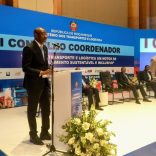Anamola wants a new political system in Mozambique, with prime minister as head of government among ...
INSS “is not a public henhouse” – Nyusi

Noticias
Mozambican President Filipe Nyusi on Wednesday demanded that the managers of the National Social Security Institute (INSS) treat correctly the money belonging to the country’s workers, and stop transforming the INSS “into a public henhouse, where everybody goes to pick up chickens”.
The INSS has been rocked by repeated corruption scandals, and Nyusi was clearly referring to a culture of waste embedded in the institution. This, he said, “happens with those who don’t produce, but who receive money from others”.
The INSS was set up to manage the compulsory social security system, and guarantee its sustainability and financial robustness. But what has happened, the President remarked, was that the INSS has invested workers’ money without transparency, sometimes diverting it to private use.
Some of the investments made by the INSS were “economically non-viable”, Nyusi said. Although he did not mention it, the clearest example of a bad investment was a minor bank, Nosso Banco (Our Bank), in which the INSS was the largest shareholder, and which was liquidated last year.
Speaking at an Extraordinary Consultative Council of the Ministry of Labour, Employment and Social Security, Nyusi attacked the lack of sensitivity shown by INSS managers towards Mozambican workers.
“Those who receive something that is given to them don’t have the same sensitivity as those who produce”, he said. “If someone produces, he knows how to save. But at the INSS, we arrive, we sleep on top of the money, and we think we can waste it. No! The money isn’t ours, it belongs to the workers. We have to save”.
The funds of the INSS exist to pay benefits to the workers who have made social security contributions, and it is not a sack of money into which people can dip to satisfy their personal needs, Nyusi declared.
Extending his henhouse metaphor, Nyusi said that when the eggs are taken, the chickens will not breed. “Eat it when it’s still in the egg, and the system doesn’t reproduce”, he warned.
The President wanted the INSS to defend and cherish the interests of workers. If necessary, that might means reducing the number of people employed by the INSS. He demanded that the INSS should be an active rather than a passive body, and each of its staff should have specific tasks to carry out.
Nyusi also visited the Alberto Cassimo Professional Training and Labour Studies Institute (named after Mozambique’s first Labour Minister). This Institute administers 17 training centres throughout the country, offering a variety of courses aimed at the industrial sector. In 2015 and 2016, the Institute offered training to 869,763 people, and in the first quarter of this year its courses were attended by 9,263 people.
Although Nyusi expressed satisfaction at the work of the centre, he said the time had come to make it self-sustaining so that it no longer depends exclusively on the state budget. He wanted the Institute to sign apprenticeship agreements with companies, so that its graduates could be rapidly inserted into the labour market.
“Staff should be trained that the market believes in”, said Nyusi. “You should seek certification so that the institute serves not just the national market, but the regional market”.
He urged the Institute to keep a data base on its graduates, accompanying their work and assessing on the ground the return on what they had learnt at the Institute’s courses.












Leave a Reply
Be the First to Comment!
You must be logged in to post a comment.
You must be logged in to post a comment.